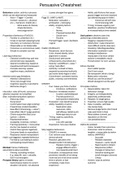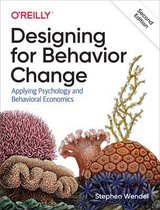Persuasive Cheatsheet
Behaviour: action, activity or process - Losses stronger than gains - Ability: add frictions that cause
which can be observed and measured pause (trigger eval over reaction)
- Actor + Trigger + Context Fogg: B = MAP (or MAT) (put distracting apps in folder)
- Context: social env + physical - Motivation: sensation + - Crowd out old with new
env + mental env (habits etc.) anticipation + belonging (no time/energy left)
- More aware of choices, - Ability: simplicity factors - Timing: increase urgency (set
shape decisions, - Time deadlines, practice mindfulness)
encourage action - Money or increase/reduce time needed
- Physical/mental e ort
Properties of behaviour (FIVOCS) - Social norm Dark pattern: deceive users into
- Familiar vs unfamiliar (mt.) - Routine performing unintended actions
- Innate or learned (sleeping/cycle) - Prompt/Trigger: spark | facilitator - Nagging: repeated intrusion
- Voluntary vs involuntary (hiccup) | signal - Obstruction: make interaction
- Observable vs not observable more di cult (call to close acc)
- Conscious vs unconscious (walk) Cialdini (RUSSLAC) - Sneaking: hide/disguise/delay
- Simple vs complex (car tire) - Reciprocity: return favours information (subtotal in cart)
- Unity: shared identity (show - Interface interference:
Learning a behaviour alignment in values) manipulate UI to favor certain
- Classical conditioning: pair new - Social proof: peer power actions (unreadable unsub)
and old stimulus repeatedly (influenced by what others do) - Forced action: for cont. access
- Operant conditioning: based on - Scarcity: rare/di cult > value ^
reward/punishment/consequenc - Liking: halo e ect Ethics checklist
- Complex learning: spatial, - Authority: inclined to follow - Don’t addict people
cognitive maps, predictions requests by perceived authority - Don’t harm users
(put some rando logos on site) - Be transparent (what u doing)
Intention action gap limitations: - Commitment: consistent (active, - Make action voluntary
- Attention (distractions) public, voluntary commitments) - Would you use the product?
- Time (not enough time) - Would strangers trust the app?
- Cognitive capacity (overwhelm) CREATE
- Memories (forgor) - Cue: makes you think of action Principles of ethics
- Emotions, notifications 1. Responsibility: take it for
Heuristics: rules of thumb; conscious - Reaction: immediate intuition behaviour change
attention required, but simplified - Is action useful/pleasant 2. Integrity: act independently,
Bias: inclination/prejudice (opinion) - Provide positive UX, objectively, professionally
- Status quo bias build positive relationship 3. Respect: for target group
- Social proof - Evaluation: cost-benefit analysis 4. Expertise: ensure high quality
- Confirmation bias (align existing) - Ability: feasibility of action 5. Data: trustable, valid data
- Present bias (instant benefits) - Need action plan, - Use review body
- Ikea e ect (time/energy > value^) resources, skills, - Remove fudge factor (don’t bend
- Halo e ect (like it? judge positive) self-e cacy (belief suc6) rules and think it’s fine)
- Choice supportive bias (your - Make app easy-to-use - Raise stakes (commit, put
opinion > others) - Timing: urgency, specificity, reputation on the line)
- Representativeness consistency - Use penalties/taxes
- Availability (crotches; rember) - Link with calendar
- Framing (positively > more picks) - Experience: how was it before Define the problem
- Anchor (res based on anchor) - Vision: broader than outcomes
- Ostrich bias (ignore negatives) Stop negative behaviours - Outcomes: what to achieve,
- Outcome (leads to superstition) - CREATE in reverse tangible + measurable by below
- Reactance (resist manipulation) - Cue: remove cues (block sites, metrics (ARRRSC)
Habit: cue-triggered, repeated behaviour remove phone) - Accurate
- Formed by cue leading to action - Reaction: get peers who - Reliable (repeated
(anticipating reward helps) disapprove/don’t do behaviour measure > same result)
- Replace routine, trigger > - Rapid (quick to obtain)
Mindset: frame of reference; engage di erent action - Responsive (reflect
assumptions about world/life - Use reward/punishment changes in behaviour)
- Priming: activating mindset - Evaluation: consequences more - Sensitive (distinguish
- E.g. sleep 8h, rare = valuable, prominent, benefits of not doing small changes outcome)
don’t trust strangers more real and vivid (show screen - Cheap
Prospect theory: gains vs losses time on phone, or ban - Actions: ways to achieve
- Gains/losses relative to current completely, make more outcome
situation (ref point), not absolute expensive)






